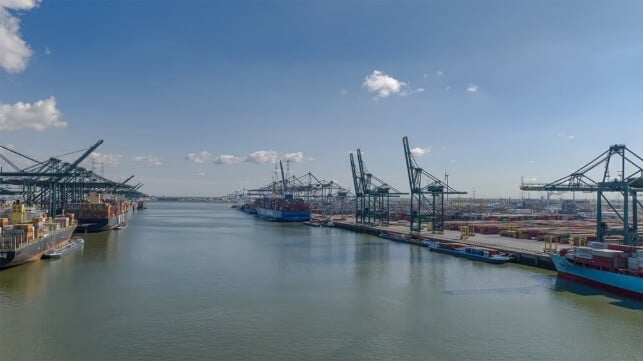Antwerp Surpasses Rotterdam in Q1 Containers as Ports Fear U.S. Tariffs

In a surprise development, the Port of Antwerp-Bruges surpassed the Port of Rotterdam for container volume during the first quarter of 2025. Traditionally Europe’s second busiest port, Antwerp-Burges highlighted its market share in the Hamburg-Le Havre Range increased to 30.5 percent, and on a global level, the port climbed one position to reach 14 in the ranking of largest ports, but like all its peers, the port is anticipating a tough period in the coming months related to the unrelenting tariff policy of Donald Trump.
Antwerp-Bruges released its first quarter throughput performance highlighting the strength of its container business while reporting an overall decline largely driven by a sharp decrease in bulk volumes. Container throughput however was up 4.6 percent in tonnage and 4.5 percent in TEUs. The ports handled 3,436,000 TEUs. By comparison, the Port of Rotterdam which has long dominated in Europe reported a 2.2 percent increase in TEUs to 3,364,000.
The Belgian port said the growth came amidst the transition to the new alliances among liner companies, industrial actions including a paralyzing port strike, and congestion at other ports, which also contributed to longer container dwell times for Antwerp-Bruges. Rotterdam said its tonnage decreased due to an eight percent decline in loaded exports, a decline in the number of transshipment containers, bad weather in January, and an operational dispute at one of its terminals which resulted in fewer ship visits, delays, and lower productivity.
During the quarter, Antwerp-Bruges handled 67.7 million tonnes of cargo, reporting a four percent overall decline, citing the weak performance in the bulk categories. Liquid cargo recorded the sharpest decline, falling by 19.1 percent impacted by gasoline, naphtha, and LNG. The segment is not only feeling the impact of sanctions against Russia and the struggling European petrochemical sector but has also been hit by changing market conditions in Africa. Belgium’s ban on high-sulfur and benzene fuels exports to Africa is having material negative effects on shipments.
Rotterdam also reported an overall 5.8 percent decline in first quarter throughput. It said the decline was also mostly due to less throughput of crude oil and oil products, iron ore, and coal.
“We are in particularly uncertain times, which makes it difficult to predict what 2025 will bring next. But as in previous crises, our port is showing resilience and operational reliability,” said Jacques Vandermeiren, Port of Antwerp-Bruges CEO. “At the same time, the protectionist measures taken by the United States make it clear that Europe needs to make a stronger commitment to robust economic policies in order to strengthen our industry and anchor its strategic position.”
Historically, the United States has been the second-largest global trading partner of Port of Antwerp-Bruges for over two decades. In 2024, the maritime trade volume accounted for approximately 10 percent of the port's overall cargo traffic. Of this, 11 million tonnes were exported to the U.S., with the port handling over 200,000 cars bound for the U.S. as well as auto and machinery parts (mostly from Germany), chemicals, vehicles, food, plastics, and pharmaceuticals.

that matters most
Get the latest maritime news delivered to your inbox daily.
Executives at the Port of Rotterdam expressed similar concerns. They noted that import duties imposed by the United States on goods exported from Europe had yet to have an effect on first-quarter throughput but were creating uncertainty.
“The first three months of this year were characterized by a high degree of volatility in world trade as a result of threatened import duties in the United States and conflicts in Ukraine and the Middle East,” said Boudewijn Siemons, CEO of Port of Rotterdam Authority. “This volatility has led to uncertainty among companies in the areas of trade and investment. We see this reflected in throughput volumes and the willingness to invest. In these uncertain times, it remains as important as ever that, together with national and European governments, the Port of Rotterdam continues to work towards a competitive European investment climate.”
